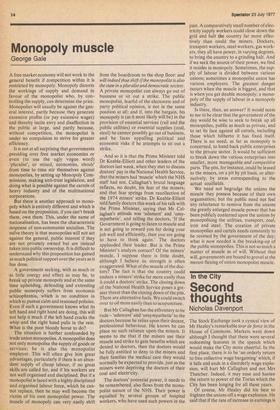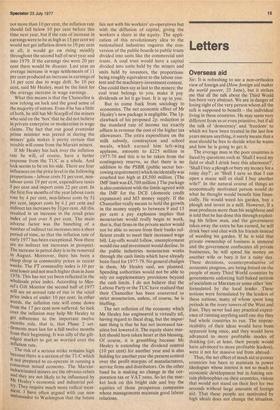In the City
Second thoughts
Nicholas Davenport
The Stock Exchange took a cynical view of Mr Healey's remarkable tour de force in the House of Commons. Markets went down although I thought that there were several redeeming features in the speech which would make the City more cheerful. In the first place, there is to be 'an orderly return to free collective wage bargaining' which, if it fails and ends in a disorderly wage explosion, will hurt Mr Callaghan and not Mrs Thatcher. Indeed, it may ease and hasten the return to power of the Tories which the City has been longing for all these years.
Of course, Mr Healey did his best to frighten the unions off a wage explosion. He said that if the rate of increase in earnings is
not more than 10 per cent, the inflation rate should fall below 10 per cent before this time next year, but if the rate of increase in earnings were to be as high as 15 per cent we would not get inflation down to 10 per cent at all; it would go on rising steadily throughout the second half of next year and into 1979. If the earnings rise were 20 per cent there would be disaster. Last year an average increase in wage settlements of 11 per cent produced an increase in earnings of 14 per cent due to wage drift. So 10 per cent, said Mr Healey, must be the limit for the average increase in wage earnings.
What this means is that the Chancellor is now relying on luck and the good sense of the majority of unions. Even if he has a little of both, he still has Mr Scargill of the miners who said on the 'box' that he did not believe in private enterprise or moderation in wage claims. The fact that our good avuncular prime minister was jeered at during the miners' gala makes it pretty certain that trouble will come from the Marxist miners.
If Mr Healey has luck aver the inflation rate he will, of course, have a better response from the TUC as a whole. And luck seems to be on his side. There are four influences on the price level in the following proportions — labour costs 51 per cent, nonlabour costs 19 per cent, expenditure taxes 8 per cent and import costs 22 per cent. In the first five months of the year labour costs rose by 4 per cent, non-labour costs by 5i per cent, import costs by 4.1 per cent and indirect tax increases by 3 per cent. All this resulted in an increase in the retail price index of just over 8 per cent, The main adverse factor was the bunching of a number of indirect tax increases into a short period of time, so that the inflation rate of early 1977 has been exceptional. Now there are no indirect tax increases in prospect. The increase in petrol duty is to be removed In August. Moreover, there has been a sharp drop in commodity prices in recent weeks. The FT commodity index is 10 per cent lower and not much higher than in June 1976. This has not yet been reflected in the wholesale price index. According to MessePs Gilt Monitor the second half of 1977 Will see an annual rate of rise in the retail price index of under 10 per cent. In other Iyords, the inflation rate will come down irnm the 17 per cent now suffered. So luck over the inflation may help Mr Healey to get adherence to the important twelve months rule, that is, that Phase 2 settlements must last for a full twelve months from their beginning. It was silly of the giltedged market to get so worried over the inflation rate.
The risk of a serious strike remains high !)ecause there is a section of the TUC which Is not prepared to co-operate in running a onsensus mixed economy. The Marxistindoctrinated miners are the obvious rebels and they are not likely to be influenced by Mr Healey's economic and industrial policy. They require much more radical treatment. I have often argued with our new ambassador to Washington that the future
lies not with his workers' co-operatives but with the diffusion of capital, giving the workers a share in the equity. The application of this revolutionary idea to the nationalised industries requires the conversion of the public boards to public trusts divided into units like the commercial unit trusts. A coal trust would have a capital divided into units held by the miners and units held by investors, the proportions being roughly equivalent to the labour content and the machinery-investment content. One could then say at last to the miners: the coal trust belongs to you, make it pay dividends or let it go bust. It is up to you.
But to come batk from sociology to economics. The net economic effect of Mr Healey's new package is negligible. The lp. clawback of his proposed 2p. reduction in the standard rate of income tax exactly 'offsets in revenue the cost of the higher tax allowances. The extra expenditure on the milk subsidy, construction and school meals, which earned him left-wing applause, amounts to £225 million in 1977-78 and this is to be taken from the contingency reserve, so that there is no addition to the PSBR (public sector borrowing requirement) which incidentally was couched too high at £8,500 million. (The IMF limit was £8,700 million.) The package is also consistent with the limits agreed with the IMF for the DCE (domestic credit expansion) and M3 money supply. If the Chancellor really means to hold the growth in the money supply to between 9 and 13 per cent a pay explosion implies that monetarism would really begin to work, that is, that firms in the private sector would not be able to secure from their banks sufficient credit to meet their increased wage bill. Lay-offs would follow, unemployment would rise and investment would decline. In the public industries monetarism works through the cash limits which have already been fixed for 1977-78. No general changes in them, Mr Healey said, are planned. Spending authorities would not be able to rely on supplementary provisions beyond the cash limits. I do not believe that the Labour Party or the TUC have realised that their Chancellor has been converted to strict monetarism, unless, of course, he is bluffing.
The net reflation of the economy which Mr Healey has engineered is virtually nil, having regard to fiscal drag, but the imporz tant thing is that he has not increased taxation but lowered it. The equity share market should have taken heart at this blessing. Of course, it is grumbling because Mr Healey is extending the dividend control (10 per cent) for another year and is also holding for another year the present control over the profit margins of manufacturers, service firms and distributors. On the other hand he is making no change in the corporation tax or VAT rates. So let the market look on this bright side and buy the equities of those prosperous companies whose managements maintain good labour relations.







































 Previous page
Previous page